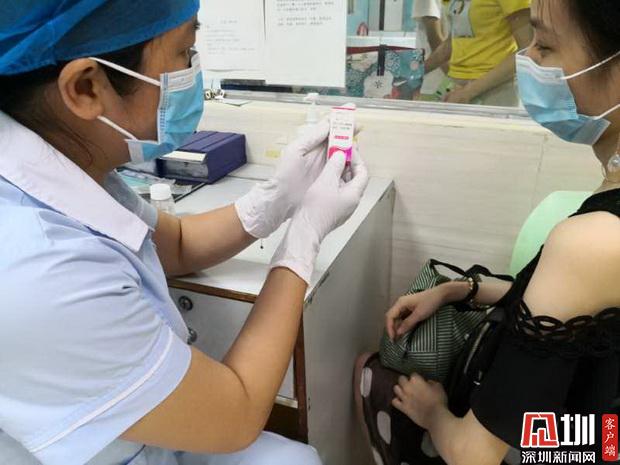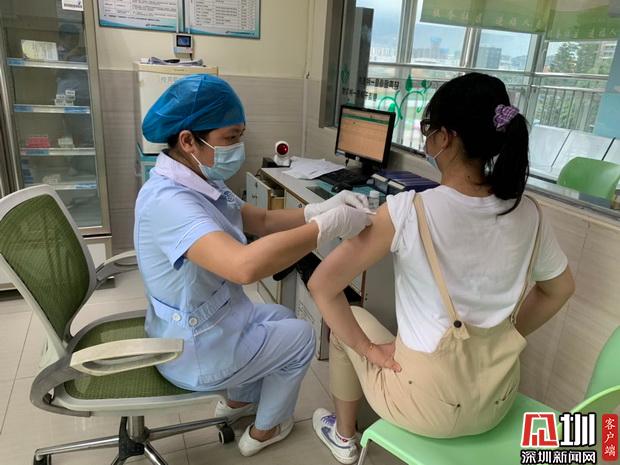
On-site inoculation of domestic bivalent HPV vaccine in Tangwei Social Health Center of Fenghuang Street.
See Shenzhen Client Shenzhen News Network on July 1, 2020. (See Shenzhen Client, Shenzhen News Network reporter Liu Mengting Tang Liling)The first batch of domestic bivalent cervical cancer vaccine in Shenzhen has arrived!At 10: 55 am on July 1, Ms. Li, 41, was vaccinated with a domestic bivalent HPV vaccine with her friends at Tangwei Social Health Center, Fenghuang Street, Guangming District, Shenzhen. This is the first shot made by Shenzhen after the vaccine, which is completely produced by China with independent intellectual property rights, was approved for listing.
It is reported that Ms. Li made an appointment through the information sent by Tangwei Social Health Center on June 30, and the friends who came with her also vaccinated the domestic bivalent HPV vaccine after Ms. Li was vaccinated.
Zhu Ziyin, a staff member of Tangwei Social Health, said that on June 30, a vaccination notice was issued in the community of social health, and 12 people made an appointment in half an hour, and a total of 20 vaccines were prepared. The medical insurance card can be used for vaccination in this social health center, and the medical insurance card must be a first-class user. The account with a balance of more than 6387.85 yuan in the card can directly deduct the domestic bivalent HPV vaccination fee with the medical insurance card. "The social health center is regularly vaccinated against cervical cancer every Wednesday. You don’t need to make an appointment. You can go directly to the site to get the vaccination." She added.
The reporter learned from the Shenzhen Center for Disease Control and Prevention that up to now, only two social health centers in Shenzhen, Tangwei Social Health Service Center and Xinwei Social Health Service Center, have purchased domestic bivalent HPV vaccines. The reporter selected one of them to understand the vaccination situation at this stage.
The price of bivalent HPV vaccine is 329 yuan, which can resist about 85% of carcinogenic virus types.
Cervical cancer is one of the most common malignant tumors of female reproductive system in China. The data shows that in 2015, there were about 100,000 new cases of cervical cancer in China, with about 30,000 deaths, and about 84 people died of cervical cancer every day. More seriously, the incidence of cervical cancer is younger, and the proportion of patients under 35 years old is increasing year by year.
It is reported that tests in European and American countries have found that HPV16 and HPV 18 are carcinogenic viruses, which cause about 70% of cervical cancer. In China, these two viruses are closely related to 84% of cervical cancer due to ethnic differences. Vaccination as soon as possible can effectively avoid the invasion of these two most important carcinogenic viruses and reduce the risk of cervical cancer.
Completing HPV vaccination is one of the effective means to prevent cervical cancer. The bivalent HPV vaccine is aimed at HPV16 and HPV18 oncogenic viruses. At present, the price of a single domestic vaccine is 329 yuan/needle. Vaccinate two doses at the age of 9 ~ 14, the immunization program is "0-6", and the second dose is vaccinated within 6 months, including the service fee of 708 yuan; Women aged 15-45 years were vaccinated with three injections, and the immunization program was "0-1-6". The second injection was given one month after the first injection, and the third injection was finished within six months. The total cost was 1,062 yuan.
It is understood that the import of bivalent vaccine requires 580 yuan for each needle (three shots are required); The tetravalent vaccine costs 798 yuan per needle (three needles); Nine-valent vaccine needs 1298 yuan per needle (three needles); The domestic bivalent vaccine is priced at 329 yuan per needle (two needles in young age and three needles over 15 years old). Compared with imported vaccines, the domestic bivalent vaccine vaccination price is nearly half cheaper.

On-site inoculation of domestic bivalent HPV vaccine in Tangwei Social Health Center of Fenghuang Street.
Who: 9-14 years old is the best age for HPV vaccination.
Cervical cancer is the most common malignant tumor in women after breast cancer. According to the statistics of the World Health Organization in 2018, there are about 570,000 new cases of cervical cancer and about 311,000 deaths worldwide every year. There are about 106,000 new cases and 48,000 deaths in China every year.
According to public information, in 2018, the World Health Organization called for the global elimination of cervical cancer. The vaccination coverage rate of girls aged 9-14 reached 90%, while the vaccination rate of girls aged 9-14 in China was less than 0.05%. In response to this incident, the National Health and Health Commission and other 10 departments jointly formulated the Healthy China Action-Implementation Plan for Cancer Prevention and Control (2019-2022), which strengthened the scientific propaganda of human papillomavirus vaccine (HPV vaccine) vaccination, implemented cancer prevention and control actions, promoted vaccination of school-age people, and effectively safeguarded the health of the broad masses of the people.
Cervical cancer is mainly caused by human papillomavirus (HPV) infection, and it is a preventable cancer. The preventive measures are cervical cancer vaccination and cervical cancer screening. It is generally believed that HPV vaccination is best before the first substantive sexual contact of women-the main route of HPV infection is sexual transmission. Inoculation after infection will not give full play to the vaccine effect. Accordingly, the World Health Organization has designated 9-14 years old as the best vaccination age.
The higher the titer of HPV vaccine, the better? Expert: Not really.
The bivalent vaccine is suitable for women aged 9-45, and the tetravalent vaccine is suitable for women aged 20-45. Women over 26 years old and 6 months old can also choose to take bivalent or tetravalent HPV vaccine to protect themselves.
"Price" represents the preventable virus species. Bivalent HPV vaccine can prevent more than 70% of cervical cancer; Tetravalent HPV vaccine can prevent more than 70% of cervical cancer and more than 90% of genital warts; Nine-valent HPV vaccine can prevent more than 90% of cervical cancer and more than 90% of genital warts.
"If we only make a simple judgment from the price, it will aggravate the tension of the nine-valent vaccine. Women aged 16 to 26 years and 6 months are suitable for the three HPV vaccines. It is recommended to analyze rationally and choose the vaccine that suits them." Experts from Shenzhen CDC said that the World Health Organization clearly pointed out in 2017 that the available evidence shows that bivalent, tetravalent and nonavalent vaccines have no difference in immunogenicity and effectiveness in preventing HPV-related cervical cancer of types 16 and 18, and all three vaccines can prevent most cervical cancers. The bivalent HPV vaccine has a higher infection prevention rate for the domestic population, reaching 84.5%, which is higher than the global average. If the purpose is to prevent cervical cancer, bivalent vaccine can fully meet the demand.
Experts also said that compared with the nine-valent vaccine, the two-valent vaccine and the four-valent vaccine have outstanding advantages, such as high cost performance, being paid by medical insurance and wide applicable age. Women of school age can make rational choices according to their actual situation.
About domestic bivalent HPV vaccine, you need to know
1. What kind of people are suitable for vaccination?
A: HPV vaccination is best before women have their first substantive sexual contact. The recommended age in the United States is 9 ~ 26 years old. The recommended vaccination age of bivalent vaccine is 9 ~ 25 years old, that of tetravalent vaccine is 20 ~ 45 years old, and that of nine-valent HPV vaccine is suitable for women aged 16 ~ 26.
2. Is it necessary for married and fertile women to be vaccinated with HPV?
A: Adult women who have had sex may have been infected with HPV, but HPV infection is limited to the inner layer of mucosal epithelium and will not induce a strong immune response. About 50% of women can detect antibodies after natural infection, but the titer is low, which is not enough to protect against reinfection. Therefore, it is necessary for married and fertile women to be vaccinated against cervical cancer.
3. Can pregnant women and lactating women be vaccinated? What should I do if I get pregnant after vaccination?
A: At present, there is no relevant data on vaccination of pregnant women and lactating women, and it is not recommended for pregnant women and lactating women to be vaccinated against cervical cancer for the time being. In fact, the harm of HPV is not as great as imagined. This part of women can wait for a while, and it is not too late to get HPV vaccine after the fetus is born and weaned.
The vaccine has not been found to have adverse effects on the fetus. Therefore, if you are pregnant unexpectedly within 6 months after vaccination, you can closely observe the pregnancy.
4. What is the difference between bivalent, tetravalent and nonavalent vaccines?
A: At present, there are three kinds of HPV vaccines listed in the world: bivalent, tetravalent and nine-valent. "Valence" represents the type of virus that the vaccine can prevent. Bivalent vaccine can prevent HPV16 and HPV18 virus infection. Tetravalent vaccine can prevent HPV infection of types 6, 11, 16 and 18. Nine-valent vaccine is aimed at nine subtypes of HPV6, 11, 16, 18, 31, 33, 45, 52 and 58. International research data show that the nine-valent vaccine can prevent 90% of cervical cancer.
5. Some people will feel dizzy and sick after being vaccinated with HPV vaccine. What is the current monitoring of adverse reactions of HPV vaccine?
A: Some women may have headache, fatigue and local reactions after being vaccinated with cervical cancer vaccine, such as pain, redness, itching, numbness, etc., but the data shows that people aged 9-45 are generally well tolerated after being vaccinated with HPV vaccine. At present, there are no vaccine-related deaths and teratogenic cases, but the safety testing of vaccines after large-scale marketing is still going on.
6. Can the current domestic and imported HPV vaccines guarantee lifelong immunity after vaccination?
A: HPV vaccine is still a new thing in the field of vaccine. It was born less than 20 years ago. From the international and domestic data, after the vaccination is completed according to the process, there is no need for replanting. But whether it is effective for life or not requires long-term observation to be clear.
7. Is it necessary to have regular screening after HPV vaccination?
A: Almost all cervical cancers are related to HPV, among which HPV types 16 and 18 are closely related to cervical cancer, and other types are 31, 33, 35, 39, 45, 51, 52, 58 and 59. At present, the best vaccine developed is the nine-valent cervical cancer vaccine, covering nine high-risk subtypes of HPV. These nine HPV subtypes caused 95% of cervical cancer cases, but 5% of HPV strains were still not covered by vaccine. Therefore, regardless of whether they have been vaccinated or not, it is recommended that women aged 18-65 should be screened once every 1-3 years.
关于作者